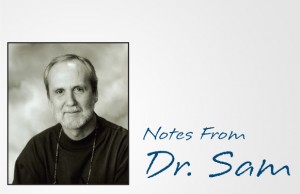If Only We Could Predict The Future

If only we could predict the future as well as Punxsutawney Phil, the world’s most famous groundhog. Every February 2—Groundhog Day—the world is privileged to have advance knowledge of the coming weather and the changing of the seasons based on the actions of a very skilled hibernating rodent.
When Phil emerges from his burrow on the appointed day, he either sees his shadow and retreats into his den or he doesn’t see his shadow and, presumably, feels comfortable parading in front of the eager cameras of the world media. If the day is sunny and he retreats out of fear of his shadow, we are destined to endure six more weeks of winter. If the day is cloudy and he does not retreat, we can be sure that spring will come early.
Incidentally, did you know that the Groundhog Day tradition is actually a modified version of early Christian lore centered on the festival of Candlemas? Apparently, long before Phil started predicting the weather, February 2 was a holiday called Candlemas, and clear weather on that day was thought to predict a long winter. Unfortunately, there is no reference to any type of rodent in this particular tradition.
The truth is, Punxsutawney Phil really isn’t that dependable when it comes to predicting the weather. In fact, in a most humorous understatement, Wikipedia reports, “While the tradition remains popular in the 21st century, studies have found no consistent correlation between a groundhog seeing its shadow and the subsequent arrival time of spring-like weather.” As it turns out, groundhogs can’t actually predict the future.
We can’t predict the future, either, but we’re smarter than groundhogs, and we can plan for likely events. Look no further than the great statesman Ben Franklin, who incidentally took a crack at weather prediction in Poor Richard’s Almanack long before groundhogs assumed that role, for a suggestion on where to begin. Franklin said, “Nothing can be said to be certain, except death and taxes.”
You need not be able to predict the future to know the end will come for each of us. Without planning, that day could bring serious financial hardship to your family. It is irresponsible to go through life without an estate plan that ensures those you leave behind know your wishes regarding your assets, that minimizes the tax implications of your death, and that keeps your estate as far away from probate court as possible. For most families, that plan will center on a trust. Some believe a last will and testament will do the trick, but a will does not keep you out of probate court the way a trust can.
Although not referenced by Franklin (but to be fair the average life expectancy for men in his day was only 36 years), another life event we should all plan for is the future need for some help. Whether the cause is age, illness, or accident, odds are there will come a day when we cannot do for ourselves everything we did in the past. We could need help managing financial matters. We could need assistance with healthcare decisions. We might eventually need home- or facility-based long-term care.
How do you plan for such a broad set of potential issues? The starting point is to execute a broad set of power of attorney documents. But you should know, all power of attorney documents are not created equal. I have reviewed many power of attorney documents in my years as an elder law attorney, and I have certainly seen some bad ones.
I’ve seen many instances where a family was unable to do the things they desperately needed to do for a loved one because the power of attorney document on which they relied didn’t say the right thing or, worse, said the outright wrong thing. Good power of attorney documents prepared by an experienced elder law attorney are not that expensive, but they can save your family a ton of time and money down the line. Think twice before using some form off the Internet for something this important.
Maybe we’re no better than Phil at predicting the future, but it doesn’t take any special skill to know there are a few things we can all see coming. While those things can’t be avoided, we can plan for them to make them a little more manageable.










0 comments